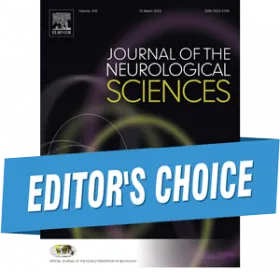Prevalence and course of muscle-specific receptor tyrosine kinase (MuSK) antibodies in myasthenia gravis
18 May 2025

Authors: Jan-Hendrik Stahl, Max Konle, Markus Kowarik, Evelyn Dubois, Marcel Armbruster, Benedict Kleiser, Alexander Grimm, Pascal Martin, Justus Marquetand
Editor's Choice
Journal of the Neurological Sciences. REVIEW ARTICLE| VOLUME 472, 123449 May 15, 2025
DOI: https://doi.org/10.1016/j.jns.2025.123449
Highlights
- This study presents MuSK-positive MG data with a maximum follow-up of 17 years.
- MuSK autoantibodies are not useful in follow-up of MuSK-positive myasthenia gravis.
- Slightly elevated MuSK autoantibodies do not indicate the presence of autoimmune disease.
Myasthenia gravis is a neuromuscular disease typically associated with acetylcholine receptor (AChR) autoantibodies. However, in AChR-negative cases, autoantibodies against muscle-specific receptor tyrosine kinase (MuSK) may be present. Given the rarity of MuSK autoantibodies, there is limited information on their development and significance as biomarkers of disease activity.
In a retrospective 10-year study, the authors tested 749 serum samples from 641 patients for MuSK autoantibodies. For MuSK-positive Myasthenia gravis cases, we extended the observation period to almost 17 years and analyzed the correlation between MuSK titers and clinical severity (Besinger score). The study also examined the association between elevated but formally negative MuSK titers and other autoimmune diseases. Of the 749 samples, 21 (3 %, n = 7 patients) were MuSK-positive. In these patients, MuSK titers did not correlate with disease severity or treatment changes. 78 samples (10 %, n = 73 patients) showed elevated but formally negative MuSK titers, with no link to other autoimmune diseases.
The authors conclude that the results contradict previous studies suggesting that MuSK autoantibodies could serve as biomarkers of Myasthenia gravis severity, and they shed light on the clinical relevance of elevated but formally negative MuSK titers.
Web design by Tribal Systems








